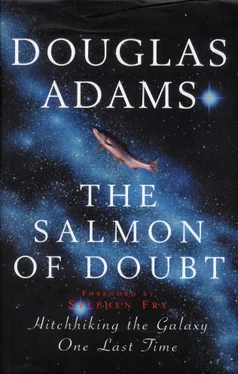“No one knows anything.”
The words caught his attention and he glanced up at the TV. A breezy Californian in the sort of Hawaiian shirt that could serve, if needed, as a distress signal was standing in the bright sunshine and answering questions, Dirk quickly worked out, about the approaching meteor. He called the meteor Toodle Pip. “Toodle Pip?” asked his interviewer, the BBC’s California correspondent. “Yeah. We call it Toodle Pip because anything it hits, you could pretty much say good-bye to.”
The Californian grinned.
“So you’re saying it is going to hit?”
“I’m saying I don’t know. Nobody knows.” “Well, the scientists at NASA are saying ...”
“NASA,” said the Californian genially, “is talking shit. They don’t know. If we don’t know, they sure as hell don’t know. Here at Similarity Engines we have the most massively powerful parallel computers on Earth, so when I say we don’t know, I know what I’m talking about. We know that we don’t know, and we know why we don’t know. NASA doesn’t even know that.”
The next item on the news was also from California, and was about a lobby group called Green Shoots, which was attracting a lot of support. Its view, and it was one that spoke to the battered psyches of many Americans, was that the world was much better able to take care of itself than we were, so there was no point in getting all worked up about it or trying to moderate our natural behaviour. “Don’t worry,” said their slogan, quoting the title of a popular song. “Be happy.”
In the morning, things suddenly seemed wonderfully clear and simple. He didn’t know the answer to anything, but he knew what to do about it. A few phone calls to the bank had established that tracing the money back to its origins was going to be hideously difficult, partly because it was an inherently complicated business anyway, partly because it quickly became clear that whoever had been paying the money to him had taken some trouble to cover his or her tracks, but mostly because the man on the foreign desk at his bank had a cleft palate. Life was too short, the weather too fine, and the world too full of interesting and exciting pitfalls. Dirk would go sailing.
Life, he was fond of telling himself, was like an ocean. You can either grind your way across it like a motorboat or you can follow the winds and the currents—in other words, go sailing. He had the wind: he was being paid by someone. Presumably that someone was paying him to do something, but what he had omitted to say. Well, that was a client’s privilege. But Dirk felt that he should respond to this generous urge to pay him, that he should do something. But what? Well, he was a private detective, and what private detectives did when they were being paid was mostly to follow people.
So that was simple. Dirk would follow someone.
Which meant that now he had to find a good current: someone to follow. Well, there was his office window, with a whole world surging by outside it—or a few people at least. He would pick one. He began to tingle with excitement that his investigation was finally under way, or would be as soon as the next person—no, not the next person, the ... fifth next person walked around the corner that he could see on the other side of the road.
He was immediately glad that he had decided to build in a brief period of mental preparation. Almost immediately number one, a large duvet of a woman, came around the corner with numbers two and three being dragged unwillingly along with her—her children, whom she nagged and scolded with every step.
Dirk breathed a sigh of relief that it wasn’t going to be her.
He stood by the side of his window, quiet with anticipation. For a few minutes no one further came round the corner. Dirk watched as the large woman bullied her two children into the newsagent opposite, despite their wails that they wanted to go home and watch TV. A minute or two later she bullied them back out into the sunshine again despite the their wails that they wanted an ice cream and a Judge Dredd comic.
She yanked them away up the road, and the scene fell quiet. The scene was a triangular-shaped one, because of the angle at which two roads collided with each other. Dirk had recently moved to this new office—new to him, that was; the actual building was old and dilapidated and remained standing more out of habit than from any inherent structural integrity—and much preferred it to his previous one, which was miles from anywhere. In his old one he could have waited all week for five people to walk around a corner.
Number four appeared.
Number four was a postman with a pushcart. A small bead of perspiration appeared on Dirk’s forehead as he began to realise how badly wrong his plan could go. And here was number five.
Number six was a different proposition altogether: a rather delicious-looking woman in jeans, with short, thick black hair. Dirk swore to himself and wondered if he hadn’t secretly meant six instead of five. But no. An undertaking was an undertaking, and he was being paid a lot of money. He owed it to whoever was paying the money to stick to whatever agreement it was that they hadn’t actually got. Number five was still standing there dithering on the street corner, and Dirk hurried quickly downstairs to take up the chase.
As he opened the cracked front door he was met by number four, the postman with the pushcart, who handed him a small bundle of letters. Dirk pocketed them and hurried out into the street and the spring sunshine.
He hadn’t followed anybody for quite a while, and discovered that he had lost the knack. He set off so enthusiastically in pursuit of his quarry that he realised he was walking far too quickly and would in fact have to walk straight past him. He did so, paused for a few confused seconds, turned, round, and started to walk back, which caused him to collide directly with his quarry. Dirk was so flummoxed to find that he had actually physically hit the person he was supposed to be stealthily tailing that in order to allay any suspicion he jumped onto a passing bus and headed off down Rosebery Avenue. This, he felt, was not an auspicious beginning. He sat on the bus for a few seconds, completely stunned at his own ineptness. He was being paid $5,000 a week for this. Well, in a sense he was. He became aware that people were looking at him slightly oddly. But not nearly as oddly, he reflected, as they would do if they had the slightest idea about what he was actually doing. He twisted round in his seat and squinted back down the road, wondering what would be a good next move. Normally, if you were tailing somebody, it was a problem if they unexpectedly jumped onto a bus, but it was almost more of a problem if you unexpectedly jumped on one yourself. It was probably best if he just got off again and tried to resume the trail, though how on earth he was going to look unobtrusive now, he didn’t know. As soon as the bus next came to a halt, he jumped off again and started walking back up Rosebery Avenue. Before he had gone very far, he noticed his quarry walking down the road in his direction. He reflected that he had managed to pick a remarkably helpful and cooperative subject, and better than he deserved. Time to get a grip and be a little more circumspect. He was almost at the door of a small cafe, so he ducked inside it.
He stood at the counter pretending to dither for a moment over the sandwiches until he sensed that the subject had passed.
The subject didn’t pass. The subject walked in and stood behind him at the counter. In a panic, Dirk ordered a tuna and sweetcorn roll, which he hated, and a cappuccino, which went particularly badly with fish, and hurried off to sit at one of the small tables. He wanted to be able to bury himself in a newspaper, but he didn’t have one, so he had to make do with his post. He pored over it intently. Various bills of the usual preposterous and wildly overoptimistic kind. Various circulars of the strange type that private detectives tended to receive—catalogues full of tiny electronic gadgets all designed to counteract each other; ads for peculiar grades of film or revolutionary new types of thin plastic strips. Dirk couldn’t be bothered with any of it, though he did pause for a moment over a flyer for a newly published book on advanced surveillance techniques. He screwed it up crossly and threw it on the floor. The last envelope was another bank statement. His bank had long ago got into the habit of sending them to him on a weekly basis, just to make the point, really. They hadn’t yet adjusted to his new sheen of solvency, or didn’t trust it. Probably hadn’t even noticed it, in fact. He opened the statement, still only half-believing.
Читать дальше










